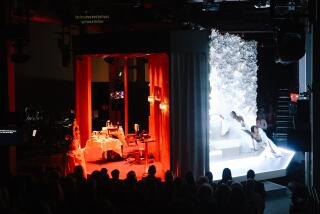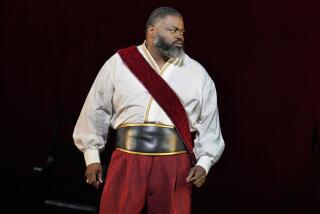DEBUT AT 69 : N.Y. DISCOVERS TADDEI AS VERDI’S FALSTAFF
NEW YORK — This city likes heroes. It loves unlikely heroes. It adores unlikely underdog heroes.
Right now, New York adores Giuseppe Taddei. The rest of the world, from Milan to Vienna to San Francisco, has long known him as a fine Italian baritone who, in the twilight years of his career, became a knowing practitioner of character parts. Insular New York didn’t discover him, however, until last week.
At the not-so-ripe old age of 69--an age that finds most singers writing memoirs and pining for a rosy past--Taddei finally made his debut at the Metropolitan Opera. Although he should have been here at least three decades ago, our leading opera company heretofore deemed him expendable.
The Met has always dealt in strange and mysterious ways.
Any cockeyed cliche-oriented optimist would insist that the debut came better late than never. Still, it could be noted that Taddei’s celebrated portrayal of Verdi’s Falstaff came to Lincoln Center very late indeed.
New York did not note any such thing. Overnight, it elected Taddei toast of the town.
To say that the toast is a little cold and stale at this point would, one would think, belabor the obvious. But the fuss in the local press, and the instant enthusiasm in the opera house Thursday, would suggest that the staleness isn’t obvious at all.
Stubbornly sentimental and amiably myopic, New York hears what it wants to hear, and responds accordingly. It is easy, of course, to respond to Taddei’s well-honed professionalism, his gutsy extroversion, his ever-articulate whisper and his elegant way with the Italian word.
It also is tempting to pretend that, miraculously, time has not tarnished his resources, or that his artistry obliterates any vocal or dramatic problems. A cool head can resist the temptation.
Taddei makes no effort to present Falstaff as a hearty nobleman who has fallen on hard times. Like many a fat operatic knight before and after him, he plays rough and plays for easy laughs.
He struts and swaggers, wears his vulgarity like a badge, guzzles wine straight from the cask, spits and sputters, enters lurching for Alice Ford’s bosom in the would-be seduction scene and, in general, lends new expressive meaning to the concept of eye-popping.
Moreover, he complements his vulgar theatrical performance with musical trickery. The once-voluminous Taddei baritone is now, understandably, a thing of threads and patches. He disguises the fact, as best he can, with parlando effects and buffo accents.
This Falstaff musters little resembling a sustained line. Ascending passages require him either to evade and avoid, to shout, or to hide under convenient orchestral blankets.
The “Falstaff” assembled by the Met around its new old hero reeks of routine. Franco Zeffirelli’s handsome production of the early 1960s certainly has seen better days. The sets have faded, the action--reconstituted by Bodo Igesz--has been blunted, and the kitschy excesses in Windsor Forest distract more than ever from the magic of the music.
Although James Levine enforces crisp articulation and brilliant orchestral sonorities, he finds little mellowness and less poetry in the score. Appropriately, perhaps, his cast concentrates on extroversion rather than finesse.
The best of the not particularly merry wives is Gail Dubinbaum, a dark-toned, spunky Meg Page. Adriana Maliponte introduces a rather loud and brittle Alice Ford. Fiorenza Cossotto provides an uncomic Dame Quickly overgenerous with basso-profondo chest tones.
Mariella Devia floats the high tones of Nannetta very sweetly but offers little else of special interest. Dalmacio Gonzalez as Fenton remains a cipher. Brent Ellis’ thoughtful Ford is a size too small for a house this big.
“Falstaff” deserves better.
More to Read
The biggest entertainment stories
Get our big stories about Hollywood, film, television, music, arts, culture and more right in your inbox as soon as they publish.
You may occasionally receive promotional content from the Los Angeles Times.










